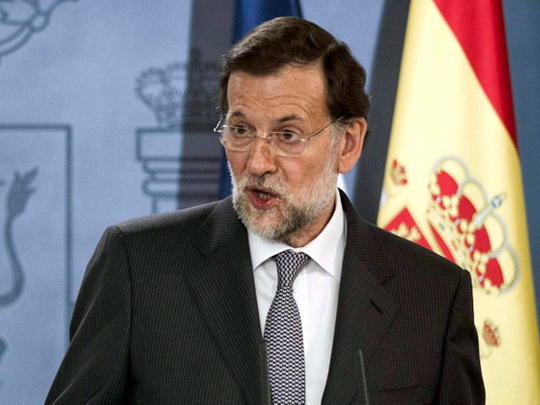
Madrid: Spain will consider seeking extra aid from Europe on top of a 100 billion euro rescue of its financial sector but does not see any need for new conditions, Prime Minister Mariano Rajoy said in an interview published in European newspapers on Sunday.
Rajoy said he wanted to see details of the European Central Bank’s (ECB) programme to buy debt of Eurozone countries with high borrowing costs before deciding whether to proceed with a request.
“If I believe it is good for Europe as a whole, for the euro, and for Spain, I will do it, and if not, not,” Spanish daily ABC quoted him as saying, regarding seeking more aid for Spain.
ECB board member Joerg Asmussen said on Thursday the ECB should only buy sovereign bonds of troubled Eurozone states if the International Monetary Fund was involved in setting conditions.
Spain is already struggling to implement austerity measures to reduce its debt burden and rescue banks hit by a collapse in property prices and Rajoy is reluctant to undertake any more for fear of being caught in a recessionary spiral.
But Germany fears the bond buying plan to help Spain and other indebted Eurozone countries lower their borrowing costs will expose it to too much risk, leaving the ECB with a delicate negotiating task.
German central bank chief Jens Weidmann was reported on Friday to have threatened to resign over the bond-buying plan. He has declined to comment on the report. ECB President Mario Draghi is trying to hammer out a deal before an ECB policy meeting on September 6.
Rajoy’s comments, made on Wednesday, came ahead of a scheduled visit by German Chancellor Angela Merkel later this week to the Spanish capital and as a Spanish request for a European rescue package is seen as increasingly inevitable.
“The looming challenge is to resolve the problems of the euro’s instability and to advance European integration,” he told French newspaper le Journal du Dimanche. “I sense that Merkel is ready to take it on.”
To receive aid from the European rescue funds, the existing EFSF or the pending ESM, he said Spain did not need to meet any further conditions than it already is under the terms of the banks rescue and the excessive deficit procedures.
“Spain, of course, is going to comply with them. It already is. And it’s not easy,” he said. “We are doing reforms. That is what the European Council said that countries have to do to go to the EFSF or the ESM to seek help to stabilize the euro.”
Praise for Merkel
Rajoy said he felt ECB President Mario Draghi agreed with him that Spain’s high borrowing costs were related to investor fears over the euro rather than the fundamentals of the Spanish economy.
He said the current situation in which some European countries financed themselves at negative rates and others paid “unsustainably high rates” had to end.
“The current situation cannot be sustained over a longer period of time,” he was quoted as saying in Germany’s Bild am Sonntag. “Therefore we must solve the problem of divergent yields now.”
Rajoy said measures had to be taken to dispel “with all clarity and decisiveness the doubts over the continued existence of the euro.”
In a sign he hoped Merkel would persuade reluctant German officials to back the ECB plan, he praised her as someone who governed “with great soundness.”
The Draghi plan involves any country wanting the ECB to buy its bonds to seek help from the Eurozone rescue funds first -- to which conditions would be attached.
It is aimed at buying the Eurozone governments time to negotiate legal and political hurdles to a longer-term response to the Eurozone crisis.
Three Eurozone sources have told Reuters Spain was already negotiating with Eurozone partners over conditions, though the country has not made a final decision to request a bailout.
Spain’s borrowing costs remain painfully high though they have recovered somewhat from a peak hit in July. The yield on the benchmark 10-year bond remains just below 7 per cent, a level seen as unsustainable in the medium term.
Despite the high prices it is paying to sell bonds, Spain has stuck to its issuance schedule this year. The Treasury faces a hump of 27.5 billion euros in debt maturing in the last 10 days of October.












